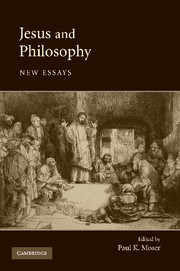Book contents
- Frontmatter
- Contents
- Preface
- Contributors
- Introduction: Jesus and Philosophy
- PART ONE JESUS IN HIS FIRST-CENTURY THOUGHT CONTEXT
- 1 Jesus: Sources and Self-Understanding
- 2 Sipping from the Cup of Wisdom
- 3 The Jesus of the Gospels and Philosophy
- 4 Paul, the Mind of Christ, and Philosophy
- PART TWO JESUS IN MEDIEVAL PHILOSOPHY
- PART THREE JESUS IN CONTEMPORARY PHILOSOPHY
- Index
- References
2 - Sipping from the Cup of Wisdom
Published online by Cambridge University Press: 05 June 2012
- Frontmatter
- Contents
- Preface
- Contributors
- Introduction: Jesus and Philosophy
- PART ONE JESUS IN HIS FIRST-CENTURY THOUGHT CONTEXT
- 1 Jesus: Sources and Self-Understanding
- 2 Sipping from the Cup of Wisdom
- 3 The Jesus of the Gospels and Philosophy
- 4 Paul, the Mind of Christ, and Philosophy
- PART TWO JESUS IN MEDIEVAL PHILOSOPHY
- PART THREE JESUS IN CONTEMPORARY PHILOSOPHY
- Index
- References
Summary
Biblical sages never asked the question that is arguably the most divisive of all intellectual queries: “Does Being exist?” With one possible exception, the sayings of a non-Israelite named Agur in Proverbs 30:1–14, they joined their ancient Near Eastern counterparts in taking the existence of a supreme power as a given. Indeed, the intelligentsia in Egypt and Mesopotamia assumed that a host of lesser gods made up a pantheon, which modern scholars identify as a Divine Council. Biblical wise men appear to have found this understanding of reality acceptable, for the prologue to the book of Job describes such an assembly of gods. In this regard, the sages merely adopted the prevailing views of the day, like the unknown author of Genesis 6:1–4, who mentions lustful sons of God who descended to earth and cohabited with women.
The belief in heavenly beings who functioned as a royal court occurs in several biblical texts and often reinforces ethical ideals, as in Deuteronomy 32:8 and Psalm 82, which allude to patron gods of the nations and their abdication of responsibility to maintain justice on earth. Other references to the Divine Council involve a semi-Platonic notion of events in heaven that are subsequently enacted on earth (1 Kgs. 22:19), add drama to a prophetic vision involving a chilling vocation (Isa. 6:1–13), or convey a sense of grandeur to the description of Yahweh as creator and savior (Isa. 40–55).
- Type
- Chapter
- Information
- Jesus and PhilosophyNew Essays, pp. 41 - 62Publisher: Cambridge University PressPrint publication year: 2008



